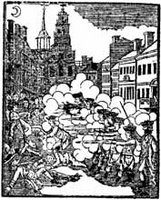Boston Massacre: really a "massacre"?
 Did the confrontation on King Street on the night of 5 March 1770 really add up to a "massacre"? The Boston town meeting commissioned a report on the incident titled A Short Narrative of the Horrid Massacre, and that name stuck. But many people today, learning that the British soldiers killed only five people, find "massacre" too extreme a term.
Did the confrontation on King Street on the night of 5 March 1770 really add up to a "massacre"? The Boston town meeting commissioned a report on the incident titled A Short Narrative of the Horrid Massacre, and that name stuck. But many people today, learning that the British soldiers killed only five people, find "massacre" too extreme a term.
I think it's useful to consider the scale of the town at that time. As I laid out in a previous post, Boston contained only about 15,500 inhabitants in 1765. The five people shot by grenadiers therefore represented one out of every 3,100 local residents.
As a comparison, on 19 April 1995, a small group of far-right American terrorists blew up a government building in Oklahoma City, killing 168 people. According to my 1995 Rand McNally road atlas, Oklahoma City then had a population of 444,700. That means the equivalent of one out of every 2,647 city residents was killed in that bombing. The shooting on King Street wasn't quite as bad, but was at about the same scale.
Thinking back to the local and national response to the Oklahoma City bombing can thus give us some sense of how Bostonians reacted to the shootings in 1770. The term "massacre" was undoubtedly inflammatory, but in March 1770 most Bostonians were feeling inflamed.
Another likely reason Boston's political leaders chose "massacre" is that Whigs in Britain had used that term to refer to the shootings at St. George's Fields in London on 10 May 1768. Soldiers had then killed six to eleven people (according to different sources) during a riot supporting John Wilkes's attempt to take his seat in Parliament. In 1770 Boston's Whigs saw themselves in common cause with British reformers, and felt that they had suffered their own "massacre" to parallel the killings in London.

2 comments:
What about the acual definition of a massacre. A cruel slaughtering of two or mmore people who are defenseless. There was nothing about the colonists or British being defenseless.
Thanks for the comment. It’s quite true that in the confrontation on King Street, neither side was defenseless. The soldiers had firearms; the crowd had sticks and overwhelming numbers.
But what's the source of that definition of “massacre”? My edition of Dr. Samuel Johnson's dictionary (which is not an 18th-century printing and therefore may not reflect the original) defines a massacre as “Butchery; indiscriminate destruction...Murder.”
That label may not seem justified, but I think that’s how the action looked to Bostonians in 1770. Certainly that’s the picture they tried to paint of the shooting.
Post a Comment